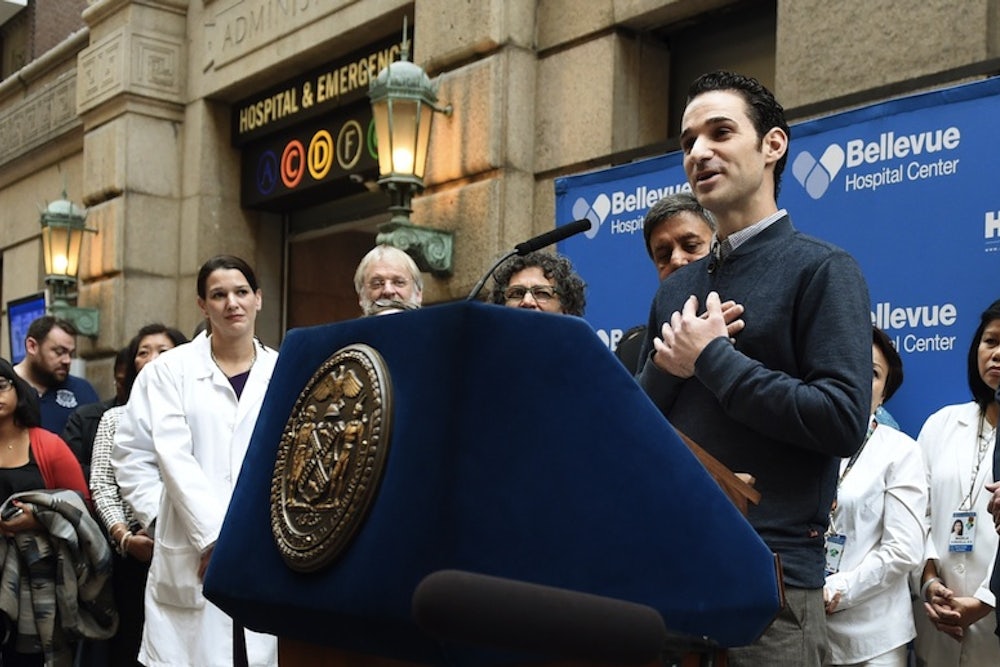Craig Spencer went home from the hospital on Tuesday, as public health officials declared the city of New York officially Ebola-free. The media treated it as welcome, if relatively unremarkable, development, while politicians barely noticed. And in one sense, their response was appropriate.
Surviving Ebola is no longer news. Virtually every patient who has undergone treatment at a U.S. hospital has recovered. The lone exception was Thomas Duncan, who died at Texas Presbyterian Hospital in Dallas. Most likely, that happened because staff there failed to recognize signs of Ebola—and sent him home—when he first arrived with symptoms. With modern medical care and round-the-clock attention, the majority and maybe the vast majority of Ebola patients seem likely to survive.
But Tuesday’s news should have gotten a great deal more attention—and perhaps provoked a few apologies—given the controversy that erupted when Spencer first got sick. Spencer, a volunteer with Doctors Without Borders, had followed the standard protocol for physicians returning from West Africa. He’d monitored his own health daily and, as soon as he detected a fever, he went to the hospital. But then he decided to ride the subway and go bowling in Brooklyn, even though he felt “sluggish.” The very next day he developed a fever, went to the hospital, and was diagnosed with the disease.
Pundits and politicians, particularly although not exclusively on the right, were outraged—at Spencer, for potentially exposing other people to the disease, and at Administration officials for failing to enact policies that would have stopped Spencer from coming into contact with other people. Two figures in particular came under attack.
One was Thomas Frieden, director of the Centers for Disease Control. Echoing the views of other public experts, Frieden had said there was no reason for panic—that the CDC had implemented proper protocols and that nobody was going to get Ebola because they rode the same subway car or used the same bowling ball as Spencer. That prompted Darrell Issa, chariman of the House Government Oversight Committee, to question Freiden’s credibility: “We have the head of the Centers for Disease Control, who is supposed to be the expert, making statements that simply are not true.” Rand Paul, the Kentucky senator and physician, said “It’s a big mistake to downplay this and act as if ‘oh, this is not a big deal, we can control all this.’ This could get beyond our control.”
The other object of intense criticism, of course, was President Obama. The government’s failure to contain Spencer became a supposed example of Obama’s weak leadership skills and failed presidency. Jeb Bush, who like Paul is contemplating a run at the presidency, called the president’s initial response to Ebola “very incompetent” and his inability to calm public fears an “unmitigated disaster.” Jodi Ersnt, who was at the time campaigning for Iowa’s Senate seat, attacked the Administration’s “failed response.” Later, Obama came under attack for not endorsing either a travel ban or, at least, a 21-day mandatory quarantine for returning visitors. Obama said it was unnecessary and potentially dangerous, because it’d discourage aid workers from going to Africa—where their presence was desperately needed, to fight the disease.
Twenty-days later after Spencer’s admission, the supposedly failed response seems to have succeeded rather spectacularly. Nobody else in New York has developed the disease, at least as of this writing. Aid workers still appear to be going. The only regrettable development was the treatment of Kaci Hickox, a Maine nurse who returned from West Africa via Newark Airport—right after a panicked New Jersey Governor Chris Christie, along with New York Governor Andrew Cuomo, had ordered mandatory quarantines for returning health care workers. Hickox, whose quarantine took place in a tent in a parking lot outside of a Newark hospital, had tested negative for Ebola. Christie released her, finally, when she threated legal action over deprivation of civil rights.
Nobody would say the CDC, or the Administration, has handled the Ebola threat perfectly. There is still reason to believe that CDC misjudged the ability of local hospitals to handle Ebola cases—and failed to develop sufficiently thorough protocols—until after Texas Presbyterian’s highly publicized dealings with Duncan. And there is still reason to wonder why somebody at CDC apparently gave Amber Vinson, a Texas Presbyterian nurse who’d cared for Duncan and had early signs of fever, permission to fly on a commercial jet. But first encounters with deadly foreign diseases are bound to test even the best advance planning. Since those early stumbles the Administration and CDC seem to have made the right calls. That’s particularly true of its refusal to endorse a travel ban—something that would have been politically easy, given public anxiety and the impending election, but counter-productive for precisely the reasons Obama said.
In an ideal world, all the angst about Ebola in the U.S. would become angst about Ebola in West Africa—where it is still spreading and threatening to become endemic, and where more resources would still help. But the media and political world have largely moved on. Apparently Ebola matters only if it’s happening here and, politically, if it can be used to embarrass the president.
